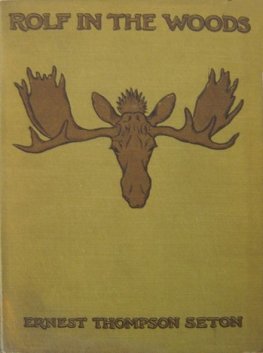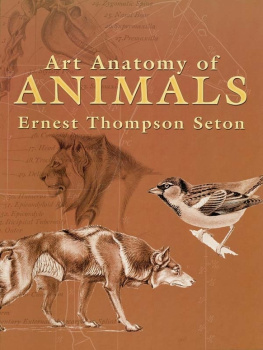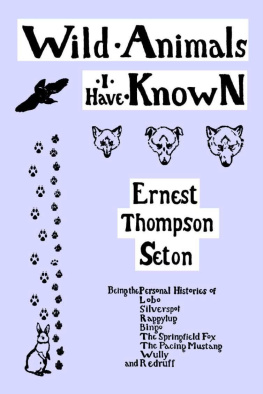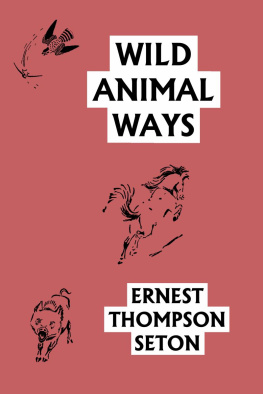Ernest Seton - Wild Animals I Have Known
Here you can read online Ernest Seton - Wild Animals I Have Known full text of the book (entire story) in english for free. Download pdf and epub, get meaning, cover and reviews about this ebook. year: 2001, genre: Science. Description of the work, (preface) as well as reviews are available. Best literature library LitArk.com created for fans of good reading and offers a wide selection of genres:
Romance novel
Science fiction
Adventure
Detective
Science
History
Home and family
Prose
Art
Politics
Computer
Non-fiction
Religion
Business
Children
Humor
Choose a favorite category and find really read worthwhile books. Enjoy immersion in the world of imagination, feel the emotions of the characters or learn something new for yourself, make an fascinating discovery.

- Book:Wild Animals I Have Known
- Author:
- Genre:
- Year:2001
- Rating:5 / 5
- Favourites:Add to favourites
- Your mark:
- 100
- 1
- 2
- 3
- 4
- 5
Wild Animals I Have Known: summary, description and annotation
We offer to read an annotation, description, summary or preface (depends on what the author of the book "Wild Animals I Have Known" wrote himself). If you haven't found the necessary information about the book — write in the comments, we will try to find it.
Wild Animals I Have Known — read online for free the complete book (whole text) full work
Below is the text of the book, divided by pages. System saving the place of the last page read, allows you to conveniently read the book "Wild Animals I Have Known" online for free, without having to search again every time where you left off. Put a bookmark, and you can go to the page where you finished reading at any time.
Font size:
Interval:
Bookmark:
WILD ANIMALS I HAVE KNOWN
By Ernest Thompson Seton
THESE STORIES are true. Although I have left the strict line of historical truth in many places, the animals in this book were all real characters. They lived the lives I have depicted, and showed the stamp of heroism and personality more strongly by far than it has been in the power of my pen to tell.
I believe that natural history has lost much by the vague general treatment that is so common. What satisfaction would be derived from a ten-page sketch of the habits and customs of Man? How much more profitable it would be to devote that space to the life of some one great man. This is the principle I have endeavored to apply to my animals. The real personality of the individual, and his view of life are my theme, rather than the ways of the race in general, as viewed by a casual and hostile human eye.
This may sound inconsistent in view of my having pieced together some of the characters, but that was made necessary by the fragmentary nature of the records. There is, however, almost no deviation from the truth in Lobo, Bingo, and the Mustang.
Lobo lived his wild romantic life from 1889 to 1894 in the Currumpaw region, as the ranchmen know too well, and died, precisely as related, on January 31, 1894.
Bingo was my dog from 1882 to 1888, in spite of interruptions, caused by lengthy visits to New York, as my Manitoban friends will remember. And my old friend, the owner of Tan, will learn from these pages how his dog really died.
The Mustang lived not far from Lobo in the early nineties. The story is given strictly as it occurred, excepting that there is a dispute as to the manner of his death. According to some testimony he broke his neck in the corral that he was first taken to. Old Turkeytrack is where he cannot be consulted to settle it.
Wully is, in a sense, a compound of two dogs; both were mongrels, of some collie blood, and were raised as sheep-dogs. The first part of Wully is given as it happened, after that it was known only that he became a savage, treacherous sheep-killer. The details of the second part belong really to another, a similar yaller dog, who long lived the double-life-a faithful sheep-dog by day, and a bloodthirsty, treacherous monster by night. Such things are less rare than is supposed, and since writing these stories I have heard of another double-lived sheep-dog that added to its night amusements the crowning barbarity of murdering the smaller dogs of the neighborhood. He had killed twenty, and hidden them in a sandpit, when discovered by his master. He died just as Wully did.
All told, I now have information of six of these Jekyll-Hyde dogs. In each case it happened to be a collie.
Redruff really lived in the Don Valley north of Toronto, and many of my companions will remember him. He was killed in 1889, between the Sugar Loaf and Castle Frank, by a creature whose name I have withheld, as it is the species, rather than the individual, that I wish to expose.
Silverspot, Raggylug, and Vixen are founded on real characters. Though I have ascribed to them the adventures of more than one of their kind, every incident in their biographies is from life.
The fact that these stories are true is the reason why all are tragic. The life of a wild animal always has a tragic end.
Such a collection of histories naturally suggests a common thoughta moral it would have been called in the last century. No doubt each different mind will find a moral to its taste, but I hope some will herein find emphasized a moral as old as Scripturewe and the beasts are kin. Man has nothing that the animals have not at least a vestige of, the animals have nothing that man does not in some degree share.
Since, then, the animals are creatures with wants and feelings differing in degree only from our own, they surely have their rights. This fact, now beginning to be recognized by the Caucasian world, was first proclaimed by Moses and was emphasized by the Buddhist over 2,000 years ago.
ERNEST THOMPSON SETON
LOBO, The King of Currumpaw
I
CURRUMPAW is a vast cattle range in northern New Mexico. It is a land of rich pastures and teeming flocks and herds, a land of rolling mesas and precious running waters that at length unite in the Currumpaw River, from which the whole region is named. And the king whose despotic power was felt over its entire extent was an old gray wolf.
Old Lobo, or the king, as the Mexicans called him, was the gigantic leader of a remarkable pack of gray wolves, that had ravaged the Currumpaw Valley for a number of years. All the shepherds and ranchmen knew him well, and, wherever he appeared with his trusty band, terror reigned supreme among the cattle, and wrath and despair among their owners. Old Lobo was a giant among wolves, and was cunning and strong in proportion to his size. His voice at night was well-known and easily distinguished from that of any of his fellows. An ordinary wolf might howl half the night about the herdsman's bivouac without attracting more than a passing notice, but when the deep roar of the old king came booming down the canon, the watcher bestirred himself and prepared to learn in the morning that fresh and serious inroads had been made among the herds.
Old Lobo's band was but a small one. This I never quite understood, for usually, when a wolf rises to the position and power that he had, he attracts a numerous following. It may be that he had as many as he desired, or perhaps his ferocious temper prevented the increase of his pack. Certain is it that Lobo had only five followers during the latter part of his reign. Each of these, however, was a wolf of renown, most of them were above the ordinary size, one in particular, the second in command, was a veritable giant, but even he was far below the leader in size and prowess. Several of the band, besides the two leaders, were especially noted. One of those was a beautiful white wolf, that the Mexicans called Blanca; this was supposed to be a female, possibly Lobo's mate. Another was a yellow wolf of remarkable swiftness, which, according to current stories had, on several occasions, captured an antelope for the pack.
It will be seen, then, that these wolves were thoroughly well-known to the cowboys and shepherds. They were frequently seen and oftener heard, and their lives were intimately associated with those of the cattlemen, who would so gladly have destroyed them. There was not a stockman on the Currumpaw who would not readily have given the value of many steers for the scalp of any one of Lobo's band, but they seemed to possess charmed lives, and defied all manner of devices to kill them. They scorned all hunters, derided all poisons, and continued, for at least five years, to exact their tribute from the Currumpaw ranchers to the extent, many said, of a cow each day. According to this estimate, therefore, the band had killed more than two thousand of the finest stock, for, as was only too well-known, they selected the best in every instance.
The old idea that a wolf was constantly in a starving state, and therefore ready to eat anything, was as far as possible from the truth in this case, for these freebooters were always sleek and well-conditioned, and were in fact most fastidious about what they ate. Any animal that had died from natural causes, or that was diseased or tainted, they would not touch, and they even rejected anything that had been killed by the stockmen. Their choice and daily food was the tenderer part of a freshly killed yearling heifer. An old bull or cow they disdained, and though they occasionally took a young calf or colt, it was quite clear that veal or horseflesh was not their favorite diet. It was also known that they were not fond of mutton, although they often amused themselves by killing sheep. One night in November, 1893, Blanca and the yellow wolf killed two hundred and fifty sheep, apparently for the fun of it, and did not eat an ounce of their flesh.
Font size:
Interval:
Bookmark:
Similar books «Wild Animals I Have Known»
Look at similar books to Wild Animals I Have Known. We have selected literature similar in name and meaning in the hope of providing readers with more options to find new, interesting, not yet read works.
Discussion, reviews of the book Wild Animals I Have Known and just readers' own opinions. Leave your comments, write what you think about the work, its meaning or the main characters. Specify what exactly you liked and what you didn't like, and why you think so.




